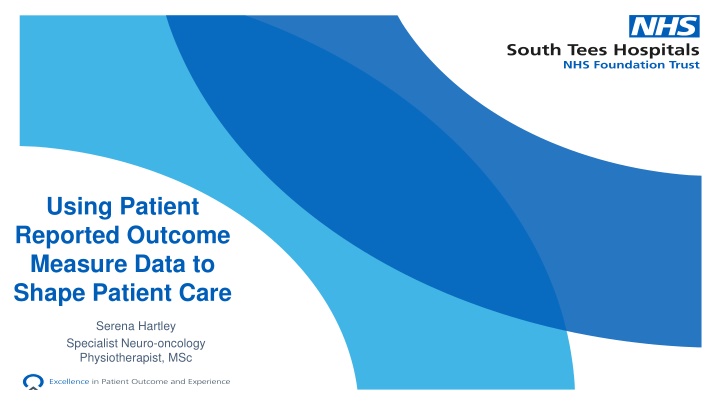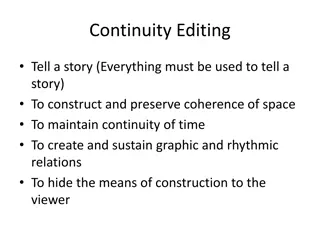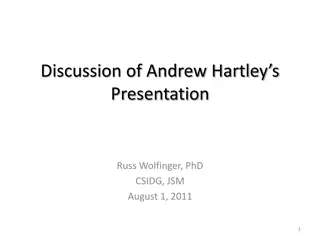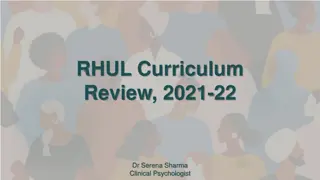
Improving Patient Care for Meningioma Patients through Outcome Measure Data Analysis
Explore the utilization of patient-reported outcome measures in shaping patient care for meningioma patients. Discuss the importance of digital technology in analyzing data and supporting patient needs. Discover the complexities of care needs and the unique challenges faced by patients with brain tumors. Enhance understanding of health-related quality of life and its impact on patient outcomes.
Uploaded on | 2 Views
Download Presentation

Please find below an Image/Link to download the presentation.
The content on the website is provided AS IS for your information and personal use only. It may not be sold, licensed, or shared on other websites without obtaining consent from the author. If you encounter any issues during the download, it is possible that the publisher has removed the file from their server.
You are allowed to download the files provided on this website for personal or commercial use, subject to the condition that they are used lawfully. All files are the property of their respective owners.
The content on the website is provided AS IS for your information and personal use only. It may not be sold, licensed, or shared on other websites without obtaining consent from the author.
E N D
Presentation Transcript
Using Patient Reported Outcome Measure Data to Shape Patient Care Serena Hartley Specialist Neuro-oncology Physiotherapist, MSc
Aim of Presentation Re-configuration of an existing service to improve patient care for patients with a meningioma Primary brain tumour The importance of using patient reported outcome data to shape patient care Digital technology used to analyse patient reported outcome data in my MSc research to support the need for this service and to assist in determining patient s needs Future plans to use digital technologies to support this service
Interdisciplinary Clinic for Patients with a Meningioma Neuropsychologist Neuropsychologist Patient One Stop Shop Comprehensive Assessment Patient One Stop Shop Comprehensive Assessment Speech and Language Speech and Language Therapist Therapist Physiotherapist Physiotherapist Occupational Occupational Therapist Therapist Initial assessment - Provides further information to support the surgeon s clinical decision- making for proceeding with surgery and to plan for support before and following surgery Six months following surgery - To provide support, advice and referral to appropriate services to optimise quality of life and support self-management
Nice Guidelines Care needs are complex and present a unique challenge All patients with a brain tumour should be offered a neurological rehabilitation assessment of physical, cognitive, and emotional function at diagnosis and every stage of follow-up. Improving Outcomes for People with Brain and Other CNS Tumours (2006) Brain tumours (primary) and brain metastases in adults (July 2018) Access to this is not always available to patients with a meningioma (Wong, 2011). Research has focussed on malignant brain tumours, resulting in unidentified and unmet needs
Health Related Quality of Life (HRQOL) Definition HRQOL is a complex multi-dimensional theoretical concept of a perceived level of satisfaction and general well-being of a person, based on the interaction between their personal experiences, health condition, beliefs and values (Pace et al., 2012). Research with patients with a meningioma undergoing surgery focussed on morbidity and mortality outcomes Current literature advocates that integrating a subjective measure of HRQOL with the traditional assessment of mortality and morbidity will provide a more comprehensive evaluation of the outcome of interventions (Dirven et al., 2015). Recent research has demonstrated that although HRQOL can improve, in some cases, it may be impaired post-surgery (Zamanipoor et al., 2016; Benz et al., 2017)
Patient Reported Outcome Measures(PROMs) to measure HRQOL PROMs are often used in health care to assess HRQOL PROMs provide evidence from the patient s perspective of their health and well-being, without influence from the clinician or others (FDA, 2009) HRQOL is thought to be best assessed by the patient themselves (Thompson et al., 2016) PROMs are a method of collecting standardised data of a person s HRQOL at a single point in time, in the form of self-completed questionnaires generating an overall score of HRQOL
Patient Reported Outcome Measures (PROM) PROMs Are promoted in routine clinical practice as part of the government s wider quality improvement agenda (DH, 2011; Black et al., 2013). Facilitate better communication and decision-making between health professionals and patients (Appleby and Devlin, 2005; Chen et al., 2013). Standardise care, with systematic and comprehensive monitoring to identify the patient s problems (Trotti et al., 2007). Promote person-centred therapeutic and supportive care planning care and assist in empowering the person and promote self-management( Kyte et al., 2007).
A Longitudinal Study to Investigate the HRQOL using PROMs of Adult Patients with a Meningioma Brain Tumour Undergoing Neurosurgery Aim Gain further understanding of the HRQOL issues, to highlight their therapeutic and supportive care needs and support the development of the Interdisciplinary Clinic Method Secondary data analysis of the HRQOL outcome data collected at the interdisciplinary clinic before and six months following surgery from 30 patients with a meningioma between April 2015 and March 2018. HRQOL PROM - The Functional Assessment Cancer Therapy Brain (FACT-BR) - Disease- specific PROM which has high validity and reliability, supporting it s sensitivity in assessing HRQOL in brain tumour patients (Weitzner et al., 1995).
Digital Technologies Identification of the research evidence to provide the basis for the research using relevant electronic databases; CINHAL, MEDLINE, Cochrane Anonymised and non-identifiable data sets were extracted from the secondary data by a gatekeeper and inputted onto a Microsoft excel spreadsheet for storage, calculations and graphics SPSS Statistics software package used for complex statistical analysis. To demonstrate significant improvements and compare with normative data. Provide visual comparisons using charts/graphs
Comparison of HRQOL Scores with Normative Data Before and Six Months Following Surgery Significantly impaired HRQOL scores before(p=0.001) and six months following surgery(p=0.003) compared to the Normative Data (FACIT.org) Comparison of the Pre and Post-surgery and Normative Mean HRQOL Scores 90 80 70 60 Mean HRQOL Score 50 Pre-op 40 Post-op Normative 30 20 10 0 FACT G Physical Domain Pre and Post-Surgery and Normative HRQOL Data Social Domain Emotional Domain Functional Domain
Comparison of HRQOL Scores Six Months Following Surgery with that Before Surgery
Main Concerns Identified before Surgery
Discussion Points The results of this study suggests that patients with a meningioma may experience HRQOL issues and have therapeutic and supportive care needs in the year following surgery, supporting the development of an interdisciplinary assessment clinic to address these needs Fatigue is a significant issue pre and post-surgery PROMs measuring HRQOL such as the FACT-BR provide structure for improved identification of patients issues The potential negative impact on HRQOL raises the importance of careful consideration of the risks/benefits when proceeding with surgery, which must be weighed against the potentially slow progression of the condition
Developments Addition of low grade and other benign tumours OT clinic developed to support patients with identified issues at the six month assessment Longer Term assessment of patients with a meningioma following surgery and assessment of the QOL of the carers Macmillan Co-ordinator funding which supports the clinic and provides further support to patients Seeking funding for IPADs/tablets for collecting, storing and analysing the outcome data and to facilitate self-management; Information resources, forums and Apps
Acknowledgements Professor P Kane Consultant Neurosurgeon Mr A Varma Consultant Neurosurgeon Dr Don Brechin - Clinical Director of the Medical Psychology Service and the Adult Neuropsychology Department Caroline Barber Miller - Advanced Practitioner Neuro-Oncology Occupational Therapist Jenny Collins - Specialist Neuro-Oncology Physiotherapist Kathryn Dawson - Highly Specialised Neuro-Oncology Speech and Language Therapist Karen Baldwin - Highly Specialised Neuro-Oncology Speech and Language Therapist Kate Helstrip Secretary to Consultant Neurosurgeons Emma Sheehan Secretary to Medical Psychology and Neuropsychology Dept. Contact details serena.hartley1@nhs.net
References NICE (2006) Improving Outcomes for people with Brain and other Central Nervous System Tumours. National Institute of Clinical for Clinical Excellence. NICE (2018) Brain tumours (primary) and brain metastases in adults Wong, J. et al. (2011; 2010) 'A qualitative assessment of the supportive care and resource needs of patients undergoing craniotomy for benign brain tumours', Supportive Care in Cancer, 19(11), pp. 1841-1848. Pace, A. et al. (2012) 'Quality of life of brain tumour patients', European Association of NeuroOncology Magazine, 2(3), pp. 118-122. Black, N. (2013) 'Patient reported outcome measures could help transform healthcare', BMJ (Clinical Research Ed.), 346(1), pp. 167. Devlin, N.J. and Appleby, J. (2010) 'Getting the most out of PROMS', Putting Health Outcomes at the Heart of NHS Decision Making. London: King s Fund. Available at: https://www.kingsfund.org.uk/sites/default/files/Getting-the- most-out-of-PROMs-Nancy-Devlin-John-Appleby-Kings-Fund-March-2010.pdf Benz, L.S. et al. (2018) 'Quality of life after surgery for intracranial meningioma', Cancer Cytopathology, 124(1), pp. 161-166. Weitzner, M.A. et al. (1995) 'The Functional Assessment of Cancer Therapy (FACT) scale. Development of a brain subscale and revalidation of the general version (FACT-G) in patients with primary brain tumors', Cancer, 75(5), pp. 1151-1161. Zamanipoor Najafabadi, A.H. et al. (2016) 'Impaired health-related quality of life in meningioma patients-a systematic review', Neuro-Oncology, 19(7), pp.897-907. FACIT.org (2010) Questionnaires. Available at: http://www.facit.org/FACITOrg/Questionnaires



















